#decolonizing history
Explore tagged Tumblr posts
Text
Wilde is not a Social Class
part 1: What "Civil" and "Wilde" really meant
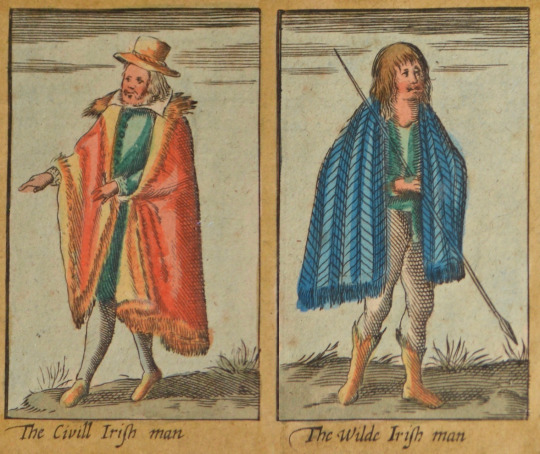
The "Civill" Irish man and the "Wilde" Irish man from a 1676 colorization of John Speed's 1611 map of Ireland
“the wilde men in Ireland, properly called Woodkarne . . .”
-John Derrick “The Image of Irelande” 1581
The labels ‘civil’ and ‘wilde’ show up in several 16th and 17th century depictions of Irish people. These include an illustration by Lucas De Heere, John Speed's map of Ireland, and John Derrick's The Image of Irelande, which are all frequently used as sources in Irish dress history. Many modern viewers have misinterpreted these terms as indicators of socioeconomic status or social class with 'civil' interpreted as meaning middle class and 'wilde' interpreted as poor. (Dunlevy also specifies that 'civill Irish' means the '(non-military) middle class'. The word civilian did not acquire the meaning 'not part of the military' until the 19th century, so it is not applicable to 16th and 17th c. usage.) This misconception about the historical meaning of these terms distorts our understanding of how the Irish dressed during the 16th and 17th centuries. In order to accurately interpret these images, we first need to understand how the terms 'wilde' and 'civil' were actually used during this period.
In this post, I will discuss what these terms meant historically, how they were used in 16th and 17th c descriptions of the Irish, and what they are actually telling us about the Irish people in Speed's illustrations.
The terms 'wilde' and 'civil' were used not by the Irish themselves but instead by the British and continental Europeans to describe the Irish (Dunlevy 1989). John Speed and John Derrick were English; Lucas De Heere was a Flemish artist who never went to Ireland and was given information about the Irish by the English (McClintock 1943).
Randle Cotgrave's A Dictionarie of the French and English Tongues, published in 1611, gives us a period definition of civil. It defines Civil as: "civill, courteous, gentle, mannerlie, well-behaved; also, temperate, mild, quiet; also, towne-bred, or burguerlike; also, politicke, lay, secular, civill." There is nothing about wealth or social class in this definition. Civil instead means civilized; it refers to a person's behavior or urban residence.
The concept of the wild man as the antithesis of urban-dwelling, civilized man is as old as civilization itself, with the oldest recorded example being the ancient Sumerian figure of Enkidu from the stories of Gilgamesh. It shows up in ancient Greek and Roman texts as monstrous wild men being said to live in foreign places like Libya and Ethiopia. In Christian Medieval Europe, wild men became a hairy subhuman race separate from, yet living near, civilization (Husband 1980).
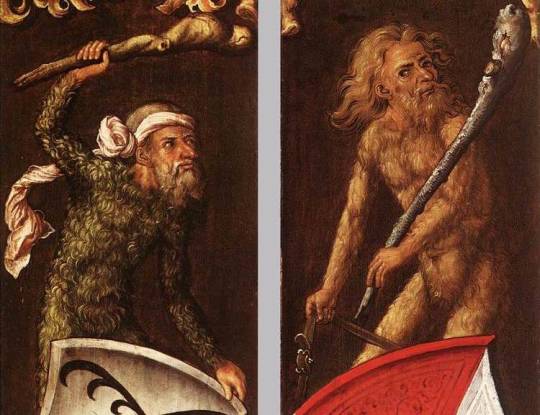
2 Wild Men by Albrecht Dürer, 1499
Medieval wild men and women had long, unkempt hair, wore little to no clothing, and fed on wild plants and raw meat rather than farming. They were characterized as violent, brutish and irrational. Because of their proximity to nature, they were sometimes portrayed as having an unusually close relationship with animals, able to ride horses without a saddle or bridle (Husband 1980).
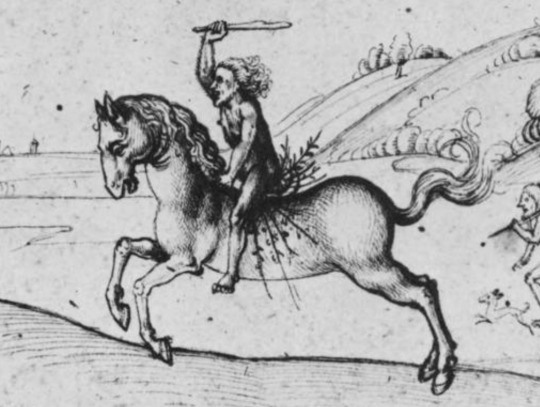
Wild man riding with no bridle and sticks for a saddle c1480 by Ludwig Schongauer
Although the hairy wild man of the late Middle Ages was a mythical being, this barbaric, uncivilized archetype clearly influenced 16th and 17th c portrayals of the Irish.
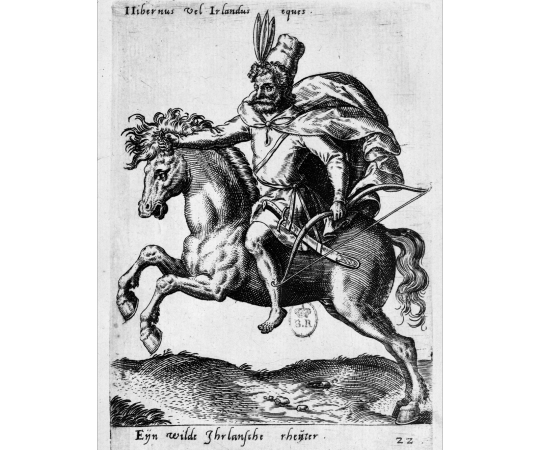
Abraham De Bruyn's c1578 "wild" Irish rider rides bareback and bridleless, in spite of the fact that the 16th c. Irish used saddles and bridles. John Speed writing in 1611 implies the complete Irish diet was watercress, roots, mushrooms, shamrocks, butter with oatmeal, milk, whey, raw meat, and congealed blood with butter. This list fits nicely with a wild man's no-farming lifestyle and conveniently omits the bread, roast mutton, meat pie, and alcohol mentioned in other period accounts of Ireland (ex Gernon 1620, Vital 1518).
These conceptions of 'wild' and 'civil' played an influential part in British colonialist policies in Scotland and Ireland. The 16th c English and King James the VI and I considered the Gaelic Irish and Highland Scots to be barbaric and the English and Lowland Scots to be civil. The plantations of Ulster and the Isle of Lewis were created as part of a series of attempts by the British crown to 'civilize' these areas (i.e. eradicate Gaelic culture). In a 1607 letter about the plantation of Lewis, King James I called the settlers "civile gentlemen" and the native Scots "wilde weedes" (Brochard 2019).
Earlier attempts by the British to "civilize" Ireland involved banning Irish culture. A 1537 statue of Parliament stated that people in Ireland were savage and wild, because of . . . cultural diversity. Yes, really.
"There is [. . .] nothing which doth more conteyne and keep many of [the King's] subjects of this his said land, in a certaine savage and wilde kind and maner of living, then the diversitie that is betwixt them in tongue, language, order, and habite, which by the eye deceiveth the multitude, and perswadeth unto them, that they should be as it were of sundry sorts, or rather of sundry countries, where indeed they be wholly together one bodie . . ."
-An Act for the English Order, Habite, and Language, Rolls of Parliament cap. 26, 28th year of Henry VIII (1537). (cited in Butler 1786). (emphasis added)
King Henry VIII was apparently afraid that the "savage" manner of living practiced by the Irish (i.e. speaking Irish, following Brehon law, and wearing Irish clothing, instead of using English language, customs, and clothing) would persuade the rest of Europe that the British Isles were not, in fact, one happily united kingdom. Of course, instead of just letting England and Ireland to be sundry countries, his solution was to ban Irish language and clothing. This policy was continued by later 16th c. British colonial administrators in Ireland.
"The inhabitants of the cities and corporate towns shall wear no mantles, shorts [sic] Irish coats, or great shirts, nor “suffer their hair to grow glebb, but to wear clerks’ gowns, jackets, jerkins, and some civil garments;” and no maid or single woman shall “wear or put on any great roll or kercher of linen cloth upon their heads, neither any great smock with great sleeves, but to put on hats, caps, French hoods, tippets, or some other civil attire upon their heads;”
-1571 Laws and ordinances proclaimed at Limerick by Sir John Perrot, Lord President of Munster [. . .] to be observed throughout that province (cited in Carew 1867). (emphasis added)
The permitted "civil" garments: gowns, jackets, jerkins, hats, caps, French hoods, and tippets were items worn in England during the 16th c. (Mikhaila & Malcolm-Davies 2006) while the banned garments: bratanna, ionair, léinte, linen rolls, and kerchiefs, and the hairstyle, glibs, are Irish fashions (Dunlevy 1989, McClintock 1943).
These examples make it clear that to 16th and 17th c artists like John Speed 'civil' meant English and 'wilde' meant Gaelic Irish. The "Civill Irish man" was anglicized. He spoke English, wore English clothing styles, and followed British laws. The "Wilde Irish man" remained culturally Gaelic. He spoke Irish, wore Irish clothing, and followed Brehon law. 'Civil' and 'wilde' did not indicate level of wealth; they indicated level of acculturation.
In part 2 of this post, I will discuss how well the interpretation that the 'wilde' Irish were poor and the 'civil' Irish were middle class matches what we actually know about dress in 17th c Ireland. Was acculturation level actually correlated with wealth?
Acknowledgement: I would like to thank the members of the reenactment group Wilde Irish for making me aware of this subject.
Bibliography:
Brochard, Thomas (2019). Plantation: Its Process in Relation to Scotland’s Atlantic Communities, 1590s–1630s. Journal of the North Atlantic, Special Volume 12, 73-94. https://www.jstor.org/stable/27133161
Butler, James G. (Ed.) (1786). The Statutes at Large, Passed in the Parliaments held in Ireland (Vol. 1). George Grierson, London.
Carew, George (1867). Calendar of the Carew Manuscripts, 1515-1574 Preserved in the Archiepiscopal Library at Lambeth. (J.S. Brewer, & W. Bullen, Eds.). Longsman, Green, Reader, & Dyer, London.
Cotgrave, Randle (1611). A Dictionarie of the French and English Tongues. Adam Islip, London.
Dunlevy, Mairead (1989). Dress in Ireland. B. T. Batsford LTD, London.
Gernon, Luke (1620). A Discourse of Ireland.
Husband, Timothy, & Gilmore-House, Gloria (1980). The Wild Man: Medieval Myth and Symbolism. The Metropolitan Museum of Art, New York.
McClintock, H. F. (1943). Old Irish and Highland Dress. Dundalgan Press, Dundalk.
Mikhaila, Ninya, & Malcolm-Davies, Jane (2006). The Tudor Tailor. Quite Specific Media Group, Ltd, London.
Speed, John (1611). The Theatre of the Empire of Great Britaine: presenting an exact geography of the kingdomes of England, Scotland, Ireland, and the iles adioyning. William Hall, London.
Vital, Laurent (1518). Archduke Ferdinand's visit to Kinsale in Ireland, an extract from Le Premier Voyage de Charles-Quint en Espagne, de 1517 à 1518. translated by Dorothy Convery.
#decolonizing history#irish history#irish dress#gaelic ireland#stair na héireann#16th century#17th century#art#british colonialism#dress history#historical dress#statutes and laws
17 notes
·
View notes
Text
17/12/23 this masterlist has been completely revamped with free access to all material. It will be updated and edited periodically so please click on my username and reblog the current version directly from me if you're able.
14/8/24 reboosting this post with How to Help Palestine updated. Please scroll to the bottom to donate or boost the links.
Palestine: The Big Damn List
(Yes, it's a lot. Just choose your preferred medium and then pick ONE.)
Podcasts
Backgrounders and Quick Facts
Interactive Maps
Teach-Out Resources
Reading Material (free)
Films and Documentaries (free)
Non-Governmental Organizations
Social Media
How You Can Help <- URGENT!!!
Podcasts
Cocktails & Capitalism: The Story of Palestine Part 1, Part 3
It Could Happen Here: The Cheapest Land is Bought with Blood, Part 2, The Balfour Declaration
Citations Needed: Media narratives and consent manufacturing around Israel-Palestine and the Gaza Siege
The Deprogram: Free Palestine, ft. decolonizatepalestine.com.
Backgrounders and Quick Facts
The Palestine Academy: Palestine 101
Institute for Middle East Understanding: Explainers and Quick Facts
Interactive Maps
Visualizing Palestine
Teach-Out Resources
1) Cambridge UCU and Pal Society
Palestine 101
Intro to Palestine Film + Art + Literature
Resources for Organising and Facilitating)
2) The Jadaliya YouTube Channel of the Arab Studies Institute
Gaza in Context Teach-in series
War on Palestine podcast
Updates and Discussions of news with co-editors Noura Erakat and Mouin Rabbani.
3) The Palestine Directory
History (virtual tours, digital archives, The Palestine Oral History Project, Documenting Palestine, Queering Palestine)
Cultural History (Palestine Open Maps, Overdue Books Zine, Palestine Poster Project)
Contemporary Voices in the Arts
Get Involved: NGOs and campaigns to help and support.
3) PalQuest Interactive Encyclopedia of the Palestine Question.
4) The Palestine Remix by Al Jazeera
Books and Articles
Free reading material
My Gdrive of Palestine/Decolonization Literature (nearly all the books recommended below + books from other recommended lists)
Five free eBooks by Verso
Three Free eBooks on Palestine by Haymarket
LGBT Activist Scott Long's Google Drive of Palestine Freedom Struggle Resources
Recommended Reading List
Academic Books
Edward Said (1979) The Question of Palestine, Random House
Ilan Pappé (2002)(ed) The Israel/Palestine Question, Routledge
Ilan Pappé (2006) The Ethnic Cleansing of Palestine, OneWorld Publications
Ilan Pappé (2011) The Forgotten Palestinians: A History of the Palestinians in Israel, Yale University Press
Ilan Pappé (2015) The Idea of Israel: A History of Power and Knowledge, Verso Books
Ilan Pappé (2017) The Biggest Prison On Earth: A History Of The Occupied Territories, OneWorld Publications
Ilan Pappé (2022) A History of Modern Palestine, Cambridge University Press
Rosemary Sayigh (2007) The Palestinians: From Peasants to Revolutionaries, Bloomsbury
Andrew Ross (2019) Stone Men: the Palestinians who Built Israel, Verso Books
Rashid Khalidi (2020) The Hundred Years’ War on Palestine: A History of Settler Colonialism and Resistance 1917–2017
Ariella Azoulay (2011) From Palestine to Israel: A Photographic Record of Destruction and State Formation, 1947-1950, Pluto Press
Ariella Azoulay and Adi Ophir (2012) The One-State Condition: Occupation and Democracy in Israel/Palestine, Stanford University Press.
Jeff Halper (2010) An Israeli in Palestine: Resisting Dispossession, Redeeming Israel, Pluto Press
Jeff Halper (2015) War Against the People: Israel, the Palestinians and Global Pacification
Jeff Halper (2021) Decolonizing Israel, Liberating Palestine: Zionism, Settler Colonialism, and the Case for One Democratic State, Pluto Press
Anthony Loewenstein (2023) The Palestine Laboratory: How Israel exports the Technology of Occupation around the World
Noura Erakat (2019) Justice for Some: Law and the Question of Palestine, Stanford University Press
Neve Gordon (2008) Israel’s Occupation, University of California Press
Joseph Massad (2006) The Persistence of the Palestinian Question: Essays on Zionism and the Palestinians, Routledge
Memoirs
Edward Said (1986) After the Last Sky: Palestine Lives, Columbia University PEdward Saidress
Edward Said (2000) Out of Place; A Memoir, First Vintage Books
Mourid Barghouti (2005) I saw Ramallah, Bloomsbury
Hatim Kanaaneh (2008) A Doctor in Galilee: The Life and Struggle of a Palestinian in Israel, Pluto Press
Raja Shehadeh (2008) Palestinian Walks: Into a Vanishing Landscape, Profile Books
Ghada Karmi (2009) In Search of Fatima: A Palestinian Story, Verso Books
Vittorio Arrigoni (2010) Gaza Stay Human, Kube Publishing
Ramzy Baroud (2010) My Father Was a Freedom Fighter: Gaza's Untold Story, Pluto Press
Izzeldin Abuelaish (2011) I Shall Not Hate: A Gaza Doctor’s Journey on the Road to Peace and Human Dignity, Bloomsbury
Atef Abu Saif (2015) The Drone Eats with Me: A Gaza Diary, Beacon Press
Anthologies
Voices from Gaza - Insaniyyat (The Society of Palestinian Anthropologists)
Letters From Gaza • Protean Magazine
Salma Khadra Jayyusi (1992) Anthology of Modern Palestinian Literature, Columbia University Press
ASHTAR Theatre (2010) The Gaza Monologues
Refaat Alreer (ed) (2014) Gaza Writes Back, Just World Books
Refaat Alreer, Laila El-Haddad (eds) (2015) Gaza Unsilenced, Just World Books
Cate Malek and Mateo Hoke (eds)(2015) Palestine Speaks: Narrative of Life under Occupation, Verso Books
Jehad Abusalim, Jennifer Bing (eds) (2022) Light in Gaza: Writings Born of Fire, Haymarket Books
Short Story Collections
Ghassan Kanafani, Hilary Kilpatrick (trans) (1968) Men in the Sun and Other Palestinian Stories, Lynne Rienner Publishers
Ghassan Kanafani, Barbara Harlow, Karen E. Riley (trans) (2000) Palestine’s Children: Returning to Haifa and Other Stories, Lynne Rienner Publishers
Atef Abu Saif (2014) The Book of Gaza: A City in Short Fiction, Comma Press
Samira Azzam, Ranya Abdelrahman (trans) (2022) Out Of Time: The Collected Short Stories of Samira Azzam
Sonia Sulaiman (2023) Muneera and the Moon; Stories Inspired by Palestinian Folklore
Essay Collections
Edward W. Said (2000) Reflections on Exile and Other Essays, Harvard University Press
Salim Tamari (2008) Mountain against the Sea: Essays on Palestinian Society and Culture, University of California Press
Fatma Kassem (2011) Palestinian Women: Narratives, histories and gendered memory, Bloombsbury
Ramzy Baroud (2019) These Chains Will Be Broken: Palestinian Stories of Struggle and Defiance in Israeli Prisons, Clarity Press
Novels
Sahar Khalifeh (1976) Wild Thorns, Saqi Books
Liyana Badr (1993) A Balcony over the Fakihani, Interlink Books
Hala Alyan (2017) Salt Houses, Harper Books
Susan Abulhawa (2011) Mornings in Jenin, Bloomsbury
Susan Abulhawa (2020) Against the Loveless World, Bloomsbury
Graphic novels
Joe Sacco (2001) Palestine
Joe Sacco (2010) Footnotes in Gaza
Naji al-Ali (2009) A Child in Palestine, Verso Books
Mohammad Sabaaneh (2021) Power Born of Dreams: My Story is Palestine, Street Noise Book*
Poetry
Fady Joudah (2008) The Earth in the Attic, Sheridan Books,
Ghassan Zaqtan, Fady Joudah (trans) (2012) Like a Straw Bird It Follows Me and Other Poems, Yale University Press
Hala Alyan (2013) Atrium: Poems, Three Rooms Press*
Mohammed El-Kurd (2021) Rifqa, Haymarket Books
Mosab Abu Toha (2022) Things You May Find Hidden in My Ear: Poems from Gaza, City Lights Publishers
Tawfiq Zayyad (2023) We Are Here to Stay, Smokestack Books*
The Works of Mahmoud Darwish
Poems
Rafeef Ziadah (2011) We Teach Life, Sir
Nasser Rabah (2022) In the Endless War
Refaat Alareer (2011) If I Must Die
Hiba Abu Nada (2023) I Grant You Refuge/ Not Just Passing
[All books except the ones starred are available in my gdrive. I'm adding more each day. But please try and buy whatever you're able or borrow from the library. Most should be available in the discounted Free Palestine Reading List by Pluto Press, Verso and Haymarket Books.]
Human Rights Reports & Documents
Information on current International Court of Justice case on ‘Legal Consequences arising from the Policies and Practices of Israel in the Occupied Palestinian Territory, including East Jerusalem’
UN Commission of Inquiry Report 2022
UN Special Rapporteur Report on Apartheid 2022
Amnesty International Report on Apartheid 2022
Human Rights Watch Report on Apartheid 2021
Report of the United Nations Fact-Finding Mission on the Gaza Conflict’ 2009 (‘The Goldstone Report’)
Advisory Opinion on the Legal Consequences of the Construction of a Wall in the Occupied Palestinian Territory, International Court of Justice, 9 July 2004
Films
Documentaries
Jenin, Jenin (2003) dir. Mohammed Bakri
Massacre (2005) dir. Monica Borgmann, Lokman Slim, Hermann Theissen
Slingshot HipHop (2008) dir. Jackie Reem Salloum
Waltz with Bashir (2008) dir. Ari Folman † (also on Amazon Prime)
Tears of Gaza (2010) dir. Vibeke Løkkeberg (also on Amazon Prime)
5 Broken Cameras (2011) dir. Emad Burnat (also on Amazon Prime)
The Gatekeepers (2012) dir. Dror Moreh (also on Amazon Prime)
The Great Book Robbery (2012) | Al Jazeera English
Al Nakba (2013) | Al Jazeera (5-episode docu-series)
The Village Under the Forest (2013) dir. Mark J. Kaplan
Where Should The Birds Fly (2013) dir. Fida Qishta
Naila and the Uprising (2017) (also on Amazon Prime)
GAZA (2019) dir. Andrew McConnell and Garry Keane
Gaza Fights For Freedom (2019) dir. Abby Martin
Little Palestine: Diary Of A Siege (2021) dir. Abdallah Al Khatib
Palestine 1920: The Other Side of the Palestinian Story (2021) | Al Jazeera World Documentary
Gaza Fights Back (2021) | MintPress News Original Documentary | dir. Dan Cohen
Innocence (2022) dir. Guy Davidi
Short Films
Fatenah (2009) dir. Ahmad Habash
Gaza-London (2009) dir. Dina Hamdan
Condom Lead (2013) dir. Tarzan Nasser, Arab Nasser
OBAIDA (2019) | Defence for Children Palestine
Theatrical Films
Divine Intervention (2002) | dir. Elia Suleiman (also on Netflix)
Paradise Now (2005) dir Hany Abu-Assad (also on Amazon Prime)
Lemon Tree (2008) (choose auto translate for English subs) (also on Amazon Prime)
It Must Be Heaven (2009) | dir. Elia Suleiman †
The Promise (2010) mini-series dir. Peter Kosminsky (Part 1, Part 2, Part 3, Part 4)
Habibi (2011)* dir. Susan Youssef
Omar (2013)* dir. Hany Abu-Assad †
3000 Nights (2015)* dir. Mai Masri
Foxtrot (2017) dir. Samuel Maoz (also on Amazon Prime)
The Time that Remains (2019) dir. Elia Suleiman †
Gaza Mon Amour (2020) dir. Tarzan Nasser, Arab Nasser †
The Viewing Booth (2020) dir. Ra'anan Alexandrowicz (on Amazon Prime and Apple TV)
Farha (2021)* | dir. Darin J. Sallam
Palestine Film Institute Archive
All links are for free viewing. The ones marked with a star (*) can be found on Netflix, while the ones marked † can be downloaded for free from my Mega account.
If you find Guy Davidi's Innocence anywhere please let me know, I can't find it for streaming or download even to rent or buy.
In 2018, BDS urged Netflix to dump Fauda, a series created by former members of IOF death squads that legitimizes and promotes racist violence and war crimes, to no avail. Please warn others to not give this series any views. BDS has not called for a boycott of Netflix. ]
NGOs
The Boycott, Divestment, Sanctions (BDS) Movement
Euro-Mediterranean Human Rights Monitor
UNRWA
Palestine Defence for Children International
Palestinian Feminist Collective
Al-Shabaka: The Palestinian Policy Network
Addameer Prisoner Support and Human Rights Association
Institute for Palestine Studies
Al Haq
Artists for Palestine
The Palestine Museum
Jewish Currents
B’Tselem
DAWN
Social Media
Palestnians on Tumblr
@el-shab-hussein
@killyfromblame
@apollos-olives
@fairuzfan
@palipunk
@sar-soor
@nabulsi
@wearenotjustnumbers2
@90-ghost
@tamarrud
@northgazaupdates
Allies and advocates (not Palestinian)
@bloglikeanegyptian beautiful posts that read like op-eds
@vyorei daily news roundups
@luthienne resistance through prose
@decolonize-the-left scoop on the US political plans and impacts
@feluka
@anneemay
(Please don't expect any of these blogs to be completely devoted to Palestine allyship; they do post regularly about it but they're still personal blogs and post whatever else they feel like. Do not harrass them.)
Gaza journalists
Motaz Azaiza IG: @motaz_azaiza | Twitter: @azaizamotaz9 | TikTok: _motaz.azaiza (left Gaza as of Jan 23)
Bisan Owda IG and TikTok: wizard_bisan1 | Twitter: @wizardbisan
Saleh Aljafarawi IG: @saleh_aljafarawi | Twitter: @S_Aljafarawi | TikTok: @saleh_aljafarawi97
Plestia Alaqad IG: @byplestia | TikTok: @plestiaaqad (left Gaza)
Wael Al-Dahdouh IG: @wael_eldahdouh | Twitter: @WaelDahdouh (left Gaza as of Jan 13)
Hind Khoudary IG: @hindkhoudary | Twitter: @Hind_Gaza
Ismail Jood IG and TikTok: @ismail.jood (announced end of coverage on Jan 25)
Yara Eid IG: @eid_yara | Twitter: @yaraeid_
Eye on Palestine IG: @eye.on.palestine | Twitter: @EyeonPalestine | TikTok: @eyes.on.palestine
Muhammad Shehada Twitter: @muhammadshehad2
(Edit: even though some journos have evacuated, the footage up to the end of their reporting is up on their social media, and they're also doing urgent fundraisers to get their families and friends to safety. Please donate or share their posts.)
News organisations
The Electronic Intifada Twitter: @intifada | IG: @electronicintifada
Quds News Network Twitter and Telegram: @QudsNen | IG: @qudsn (Arabic)
Times of Gaza IG: @timesofgaza | Twitter: @Timesofgaza | Telegram: @TIMESOFGAZA
The Palestine Chronicle Twitter: @PalestineChron | IG: @palestinechron | @palestinechronicle
Al-Jazeera Twitter: @AJEnglish | IG and TikTok: @aljazeeraenglish, @ajplus
Middle East Eye IG and TikTok: @middleeasteye | Twitter: @MiddleEastEye
Democracy Now Twitter and IG: @democracynow TikTok: @democracynow.org
Mondoweiss IG and TikTok: @mondoweiss | Twitter: @Mondoweiss
The Intercept Twitter and IG: @theintercept
MintPress Twitter: @MintPressNews | IG: mintpress
Novara Media Twitter and IG: @novaramedia
Truthout Twitter and IG: @truthout
Palestnians on Other Social Media
Noura Erakat: Legal scholar, human rights attorney, specialising in Israeli–Palestinian conflict. Twitter: @4noura | IG: @nouraerakat | (http://www.nouraerakat.com/)
Hebh Jamal: Journalist in Germany. IG and Twitter: @hebh_jamal
Taleed El Sabawi: Assistant professor of law and researcher in public health. Twitter: @el_sabawi | IG
Lexi Alexander: Filmmaker and activist. Twitter: @LexiAlex | IG: @lexialexander1
Mariam Barghouti: Writer, blogger, researcher, and journalist. Twitter: @MariamBarghouti | IG: @mariambarghouti
Rasha Abdulhadi: Queer poet, author and cultural organizer. Twitter: @rashaabdulhadi
Mohammed el-Kurd: Writer and activist from Jerusalem. IG: @mohammedelkurd | Twitter: @m7mdkurd
Ramy Abdu: Founder and Chairman of the Euro-Mediterranean Human Rights Monitor. Twitter: @RamyAbdu
Subhi: Founder of The Palestine Academy website. IG: @sbeih.jpg |TikTok @iamsbeih | Twitter: @iamsbeih
‼️How You Can Help Palestine‼️
Click for Palestine (Please reblog!!)
Masterlist of donation links by @sulfurcosmos (Please reblog!!)
Water for Gaza: Donate directly to the Gaza Municipality
Gazafunds (vetted and spotlighted GFMs)
The Butterfly Effect Project (spreadsheet of vetted GFMs)
Operation Olive Branch has been removed in light of new revelations of unethical behaviour.
Spreadsheet of Gaza fundraisers vetted by @el-shab-hussein and @nabulsi
If any links are broken let me know. Or pull up the current post to check whether it's fixed.
"Knowledge is Israel's worst enemy. Awareness is Israel's most hated and feared foe. That's why Israel bombs a university: it wants to kill openness and determination to refuse living under injustice and racism."
— Dr. Refaat Alareer, (martyred Dec 6, 2023)
From River To The Sea Palestine Will Be Free 🇵🇸🇵🇸🇵🇸
-----
Edit 1: took the first video down because turns out the animator is a terf and it links to her blog. Really sorry for any distress.
Edit 2: All recommended readings + Haymarket recommendations + essential decolonization texts have been uploaded to my linked gdrive. I will adding more periodically. Please do buy or check them out from the library if possible, but this post was made for and by poor and gatekept Global South bitches like me.
Some have complained about the memes being disrespectful. You're actually legally obligated to make fun of Israeli propaganda and Zionists. I don't make the rules.
Edit 3: "The river to the sea" does not mean the expulsion of Jews from Palestine. Believing that is genocide apologia.
Edit 4: Gazans have specifically asked us to put every effort into pushing for a ceasefire instead of donations. "Raising humanitarian aid" is a grift Western governments are pushing right now to deflect from the fact that they're sending billions to Israel to keep carpet bombing Gazans. As long as the blockades are still in place there will never be enough aid for two million people. (UPDATE: PLEASE DONATE to the Gazan's GoFundMe fundraisers to help them buy food and get out of Rafah into Egypt. E-SIMs, food and medical supplies are also essential. Please donate to the orgs linked in the How You Can Help. Go on the strikes. DO NOT STOP PROTESTING.)
Edit 5: Google drive link for academic books folder has been fixed. Also have added a ton of resources to all the other folders so please check them out.
Edit 6: Added interactive maps, Jadaliya channel, and masterlists of donation links and protest support and of factsheets.
The twitter accounts I reposted as it was given to me and I just now realized it had too many Israeli voices and almost none of the Palestinians I'm following, so it's being edited. (Update: done!) also removed sources like Jewish Voices of Peace and Breaking the Silence that do good work but have come under fair criticism from Palestinians.
Edit 7: Complete reformatting
Edit 8: Complete revamping of the social media section. It now reflects my own following list.
Edit 9: removed some more problematic people from the allies list. Remember that the 2SS is a grift that's used to normalize violence and occupation, kids. Supporting the one-state solution is lowest possible bar for allyship. It's "Free Palestine" not "Free half of Palestine and hope Israel doesn't go right back to killing them".
Edit 10: added The Palestine Directory + Al Jazeera documentary + Addameer. This "100 links per post" thing sucks.
Edit 11: more documentaries and films
Edit 12: reformatted reading list
Edit 13: had to remove @palipunk's masterlist to add another podcast. It's their pinned post and has more resources Palestinian culture and crafts if you want to check it out
Edit 14 6th May '24: I've stopped updating this masterlist so some things, like journalists still left in Gaza and how to support the student protests are missing. I've had to take a step back and am no longer able to track these things down on my own, and I've hit the '100 links per post' limit, but if you can leave suggestions for updates along with links in either the replies or my asks I will try and add them.
Edit 15 10th August: added to Palestinian allies list and reworked the Help for Palestine section. There's been a racist harrassment campaign against the Palestinian Tumblrs that vetted the Gaza fundraisers based off one mistake made by a Gazan who doesn't understand English. If you're an ally, shut that shit down. Even if you donate to a scam GFM, you're only out some coffee money; if everyone stops donating to all the GFMs in fear of scams, those families die.
Edit 16: removed entire section of allied accounts since the liberation of Syria because apparently leftists in the West are unable to both be against the Israel's genocide of Palestinians and Assad's genocide of Syrians. I should have treated the use of "Axis of Resistance" as the Tankie dog whistle it was.
Edit 17: Removed the Uncommitted Movement to pressure the Harris Presidential Campaign for obvious reasons.
Edit 18: Operation Olive Branch has come under fire for their lack of transparency, unethical behaviour and reporting their own volunteers to the FBI. Always be wary of white people spearheading anything to do with liberatory movements, from conversations to organizations.
#free palestine#palestine resources#palestine reading list#decolonization#israel palestine conflict#israel palestine war#british empire#american imperialism#apartheid#social justice#middle east history#MENA#arab history#anti zionism#palestinian art#palestinian history#palestinian culture#palestinian genocide#al nakba#ethnic cleansing#war crimes#racism#imperialism#colonialism#british colonialism#knee of huss#ask to tag#Youtube
83K notes
·
View notes
Text
“The earliest surviving South Asian epigraphy, the mid 3rd Century BCE, Edicts of Ashoka, in Greek, Aramaic and Prakrit, independently identify obligations to slaves (Greek: δούλοις) and hired workers (Greek: μισθωτοῖς), later prohibiting the trading of Slaves within the Empire.[1][4][20] “
c. 400-300 BC, an abolitionist struggle unfolded in south Asia. Is it too much to think they banned slavery, based on a text that “outlaws the trading of slaves,” like hm, no trading of slaves but just having slaves, somehow, is not inherently illegal, as long as no detectable transaction has occurred? Hm.
“Estimates suggest that in Athens between 450 and 320 BCE, 80 to 100,000 people may have been enslaved, amounting to one in four inhabitants; and that by the late first century BCE in Italy alone, 1 to 1.5 million people were enslaved, representing 15 to 25 percent of the population.“
This is a population-proportion equal to the amount of slaves in 1850s/60s Arkansas, Kentucky, or Tennessee.
It seems like lack of sailing technology prevented access to subsaharan ports, so the lack of black slaves in ancient Greece does not just automatically mean they weren’t practicing colorist / racist proto-capitalist slavery.
0 notes
Text
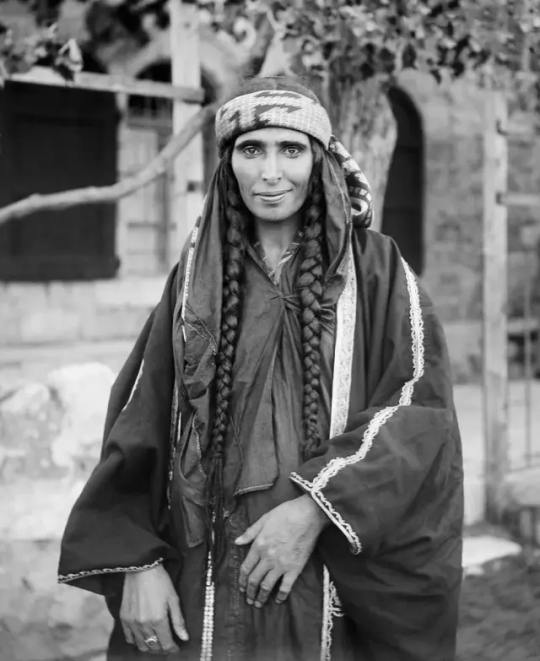
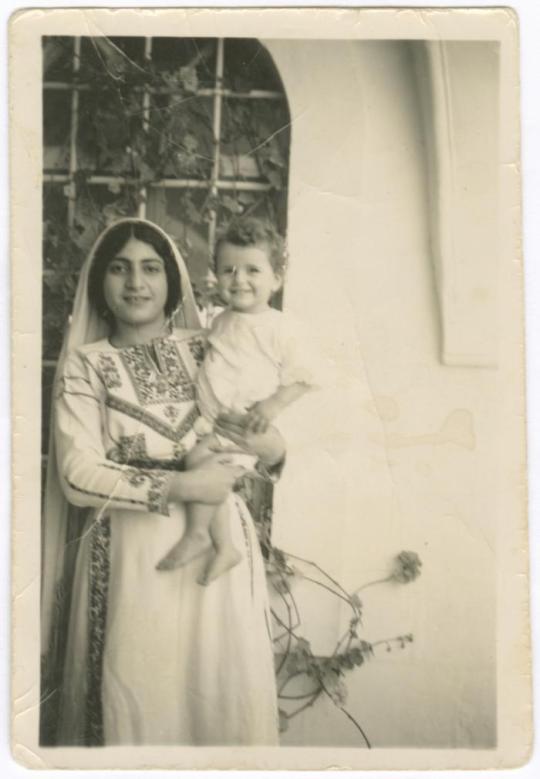
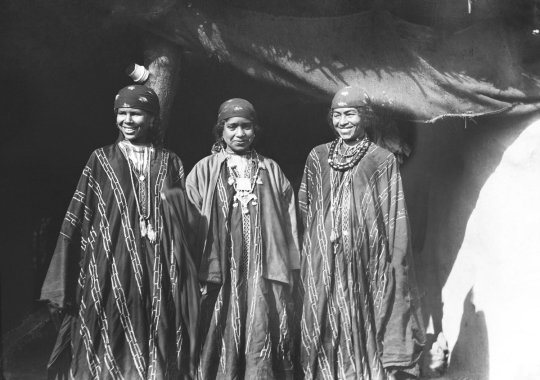
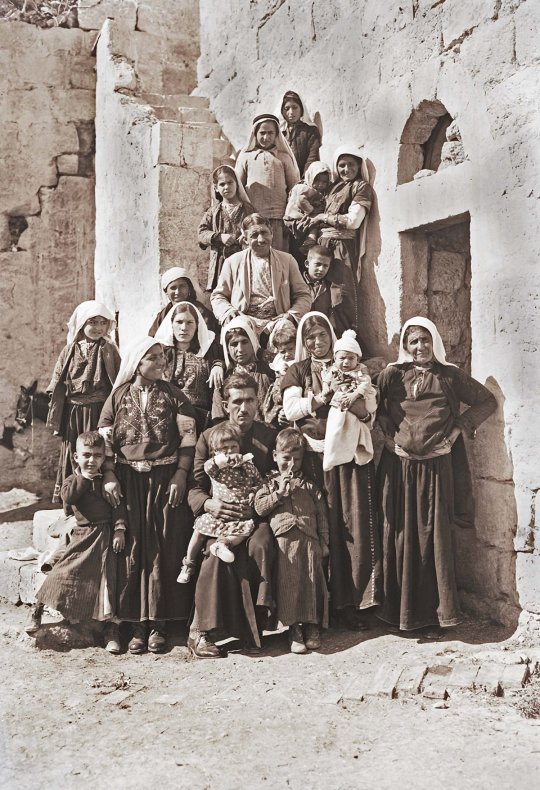
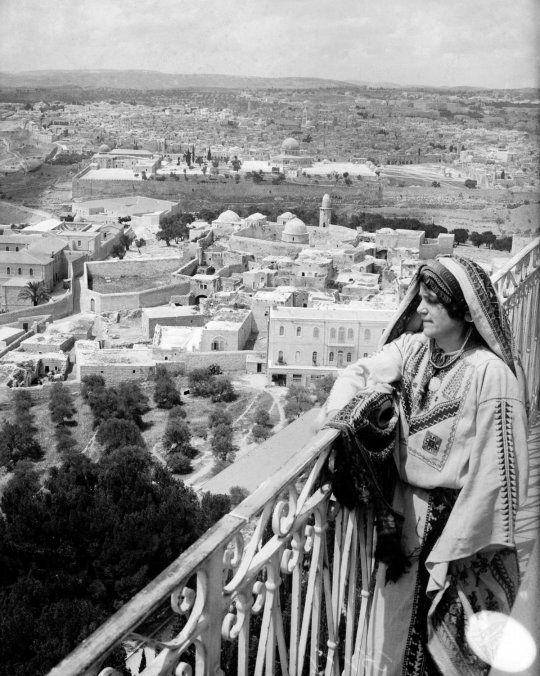
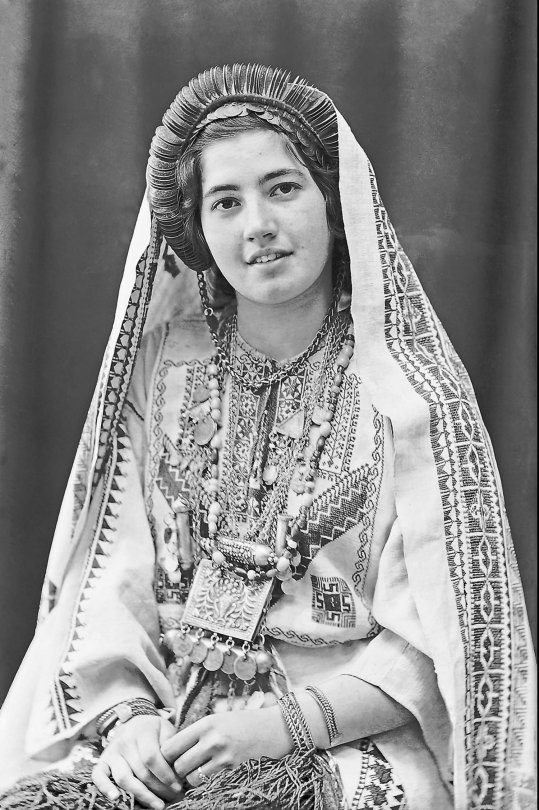

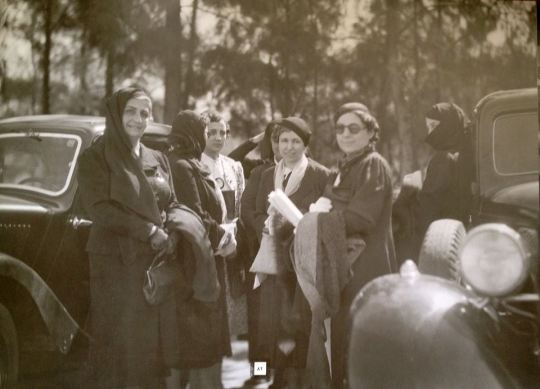
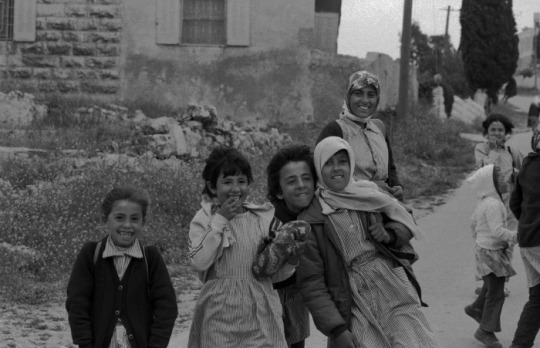
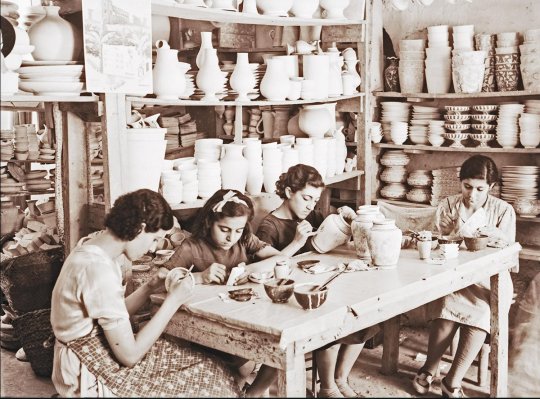
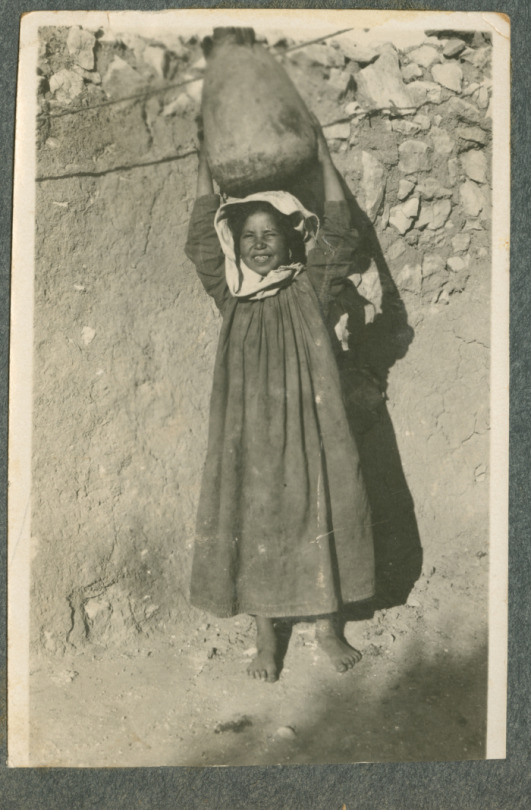

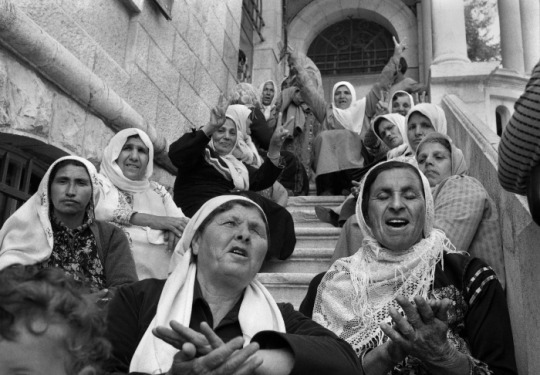
Moments from Palestine across generations and communities
(1) A Bedouin woman smiles in Jerusalem (1898-1914)
(2) Asma Aranki Holding a Child from Her Family at Their House, Birzeit (1948)
(3) Bedouin girls in Jericho (1918)
(4) An extended Palestinian family gathers in front of their house in the village of Beit Sahur, near Bethlehem (1918–35)
(5) From the Mount of Olives, a young woman looks out over eastern Jerusalem (1929)
(6) Ruth Raad, daughter of photographer Khalil Raad, in the traditional costume of Ramallah (1939)
(7) Standing in his neatly ironed shirt and shorts, George Sawabin poses for a studio photo (1942)
(8) Katingo Hanania Deeb, prepares to demonstrate in the 1936-1939 Arab Revolt -- which was a nationalist uprising by Palestinian Arabs against British colonial rule in relation to Palestinian independence and the land acquisition and pushout as a result of the mass Jewish immigration (1936)
(9) Young children walking home from school Beit Deqqo Village, the Occupied Palestinian West Bank, 1987
(10) Four young girls decorating vases in a ceramic workshop in Nablus (1920)
(11) A young Palestinian girl squints and smiles as she holds a jar on her head (1920-1950)
(12) The ancient craft of a Palestinian potter (1918-35)
(13) The mothers of Palestinian detainees' protest in Jerusalem (1987)
Source(s): The British Mandate Jerusalemites (BMJ) Photo Library, Palestinian Museum Digital Archives, The Jerusalem Story + Khalil Raad
Please support, share, cite, and (if financially able) fund these organizations and public storytellers for their rebellious histories and community work!
#decolonization#our world#our history is your history#people#free palestine#palestine#indigenous rights#art of making#and manifesting#history is not neutral#futurepast
4K notes
·
View notes
Text





Today 11/1/2024 is the seventieth anniversary of the publication of the Declaration of 1 November 1954 and beginning of the Algerian War of Independence.
The Algerian war was a landmark decolonization war. Algeria had been colonized in the mid 19th century by the French, between 500,000 and 1,000,000 Algerians were killed out of 3 million. The following decades continued with brutal oppression, Algeria was unique because it was legally classified as an integral part of France
The aftermath of the Second World War provided a unique situation. The imperial powers had fought themselves to exhaustion, suddenly formely colonized nation's were able to rise up and begin to cast off the imperial yoke.
The conflict between The National Liberation Front (FLN) and France was incredibly violent. France responded to the revolt with extreme brutality and repression, utilizing mass killings, torture, and concentration camps, 8,000 villages were destroyed and between 500,000 and 1.5 million Algerians were killed. Ultimately the Algerian people prevailed and won independence in 1962. The Algerian War is an important reminder of the horrors of colonialism and the valiant struggle for freedom.
I highly recommend A Dying Colonialism by Frantz Fanon as an excellent look into the Algerian struggle. Fanon once said "having a gun is the only chance you still have of giving a meaning to your death." These words ring especially true today for all people's engaged in a decolonization struggle.
May the independence struggle of the heroic Algerian people never be forgotten.
Long live Algeria
#algeria#algerian war#guerrilla war#decolonization#history#frantz fanon#this is my first time trying to make a post like this#if i made any mistakes please let me know
367 notes
·
View notes
Text
Woke north Americans: Decolonize Canada! Decolonize America! Decolonize language! Decolonize law! Decolonize education! Decolonize blah blah blah!
Guys, you can't even handle Israel. A country made from a decolonization project. Trust me, you arent looking to really decolonize North America, you are just looking to sound good.
#israel#jewish#truth#decolonization#jewish people are native to the lands of Israel#arabs have a big colonial history#lets talk about it#pro israel#free israel#jews are indigenous to israel
473 notes
·
View notes
Text








There is nothing to celebrate today. If you are one of the lucky few with today off (as I am), take some time to learn why.
#LandBack
Repost from @intersectionalenvironmentalist
•
There is no pride in genocide.
As the U.S. celebrates Independence Day, we cannot dismiss the continuous acts of injustice against Black and Indigenous people.
✏️About the Researcher: @kianna_pete
Kianna was a Spring 2022 Social Media Fellow at IE and studied political science and ethnicity & race studies with a specialization in Indigenous/Native studies at Columbia University. ✨
💻Sources:
peoplesworld.org/article/july-4th-whose-independence-day-is-it/
nbcnews.com/news/us-news/six-things-you-didn-t-know-about-
fourth-july-n779331
smithsonianmag.com/blogs/national-museum-american-indian/
2020/07/01/do-american-indians-celebrate-4th-july/
meaww.com/independence-day-july-4-native-americans-do-they-celebrate-lost-traditions-early-suppression
culturalsurvival.org/news/united-states-independence-masked-genocide-and-imperialism
#fourth of july#4th of july#july 4th#human rights#indigenous#indigenous rights#colonization#colonialism#colonial violence#decolonization#turtle island#united states#us government#us politics#justice#activism#enviromentalism#climate crisis#climate justice#native american#us history#american history
393 notes
·
View notes
Text
Quick history lesson.
When the French realized they would lose Algeria no matter what. That it was only a matter of time you know what plan they cooked?
A two states solution named “the Israelisation of Algeria” they wanted a “French Israel” with two states one for the settlers one for Algerians (with a neutral Sahara so they could exploit the ressources). All while praising the success of Israel as a settler colony.
The only country who still has territories on all continents because of its colonialism. A country which to these days still has a settler colony (Kanaky) was out there praising the success of Israel as a settler colony but some of y’all are out there pretending there’s not colonialism involved.
(I would also suggest checking on which side Israel was when indigenous people were taking their land and rights back in Algeria and South Africa. But that deserves its own post one day)
Edit: Adding a source in English.
#Algeria#Algeria history#decolonization#settler colonialism#antizionism#Israel is a settler colony that shouldn’t exist#free Palestine#from the river to the sea#long live to the Palestinian resistance one day they will free all of Palestine Inch’Allah
785 notes
·
View notes
Text








✨️📸🇵🇭 Celebrating and honoring our culture and the ancestors through cultural heritage photoshoots.
Here are some photos from a photoshoot I did in the San Francisco Botanical Gardens with a client of mine, Jacqueline, back in November. Together, we honored her Tagalog ancestors by doing a pre-colonial look.
I chose to use this location, as there are several balete trees in the gardens. The balete tree is steeped in Filipino folklore and beliefs, across the islands and different ethnic groups.
During my photoshoots, I tell my clients to bring an atang, a food offering, for their ancestors. For Jacqueline, she gave the offering underneath the balete tree, a perfect place to give them, as the balete tree is believed to be the home of the spirits, and was the place where the katalonan (the term for the Tagalog priestess) would go to do their maganito, (rituals).
For one of the photos, we decided to try and recreate one of the poses of an illustration of a Tagalog woman in the Boxer Codex manuscript.
➡️ Interested in following my work? Follow me on Facebook and on Instagram (@ thepinayphotographer)
✨️Interested in booking a session? Visit my website and fill out my form. Check below for my booking dates.
https://thepinayphotographer.mypixieset.com/contact/
✨️BOOKING DATES!✨️
Jan 10-February 13: NYC
February 24-26: Las Vegas
March 14-16: San Francisco/Daly City/Bay Area
March 19-21: Los Angeles
April 4-6: Chicago
April 11-19: NYC
April 27-28: Boston
May 1-19: NYC
May 23-25: Washington D.C.
#filipino#philippines#precolonial philippines#decolonization#filipino history#filipino culture#photography#photographer#filipino heritage#tagalog#boxer codex
52 notes
·
View notes
Text
happy indigenous history and pride month! tapping the sign - there can be no queer liberation withour decolonization. queer liberation that only extends to settlers is not queer liberation, it's advocating for all whites to be included in white supremacy. Indigenous queer folks cannot be liberated and colonized simultaneously. wishing safety, stability, and community to all my siblings this month <3
502 notes
·
View notes
Text

I NEED YOUR HELP TO UNDERSTAND SOMETHING:
Nowadays no one is racist. Even Nazis get offended if you call them racist. Even people covered with fascist tattoos get offended if you call them racist. Politicians who support racist policies don't see themselves as racist. Medical personnel who mistreat Black and POC intentionally are not *racist. C0ps who kill and harass Black and POC are not racist. Teachers who give Black and POC students a hard time are not racist.
Someone does something racist, you tell them "hey! That's racist" and they start crying, offended. "I'm not racist, how dare you?!" "I dated a Black person once" "I don't see color", and my personal favorite "you're the racist for calling me racist!"
There's no racism in this world because no one is racist. Racism is such a taboo nowadays. You are even afraid to discuss it on scial media.
If no one in this world is racist, then where is all this racism coming from?
#history#leftism#decolonize#decolonise#black history#europe#feminism#africa#lgbtq+#black lives matter#antiracism#antiracist#sociology#anticapitalism
218 notes
·
View notes
Text
Unrolled twitter thread by Progressive International (@ProgIntl)
30 Sept 24 • 4 minute read • Read on X
On 30 September 1965, the Indonesian military, working closely with the US government, initiated a coup that would depose President Sukarno and install the brutal, 30-year dictatorship of General Suharto.
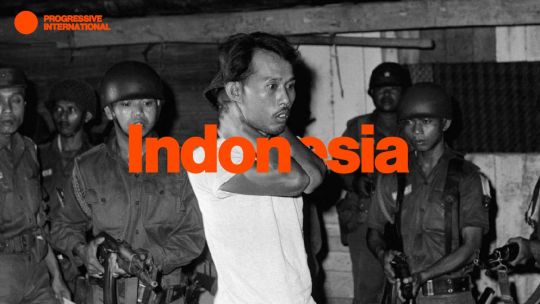
In the dark years that followed, the dictatorship massacred over a million Indonesian communists, with the CIA and US diplomats drawing up “kill lists” for the Indonesian military. The operation would become a template for the US’s regime change operations for decades to come.
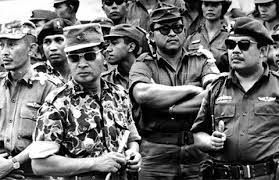
Major-General Suharto with Indonesian Army in 1966
In 1945, President Sukarno led Indonesia to independence from Dutch colonial rule. He championed the Non-Aligned Movement and hosted the historic Bandung Conference, a meeting of Afro-Asian states, in 1955.
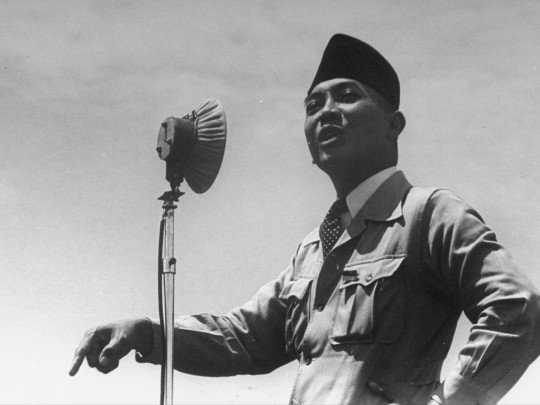
First President of Indonesia Sukarno making a speech circa 1945
Opening the conference and forecasting what was to come, Sukarno said: “We are often told ‘Colonialism is dead’. Let us not be deceived or even soothed by that… Colonialism also has its modern dress, in the form of economic control, intellectual control, actual physical control by a small, but alien community within a nation.”
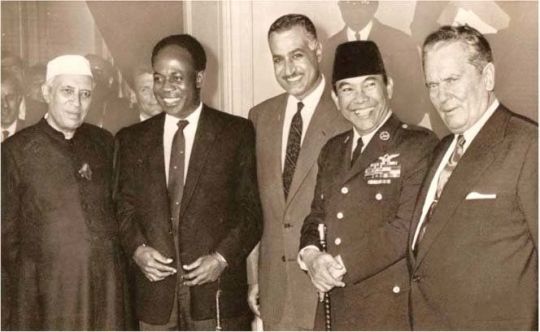
Leaders attending the Bandung Conference 1955 in Bandung, Indonesia. From left: Indian Prime Minister Jawaharlal Nehru, Ghanian Prime Minister Kwame Nkrumah, Egyptian Prime Minister Gamal Abdel Nasser, President Sukarno, and Yugoslavian Prime Minister Josip Broz Tito.
By 1965, Indonesia possessed one of the world's largest communist parties, the PKI. The PKI had a mass membership and mobilized vast numbers of people in the battle against Indonesia’s ruling class.
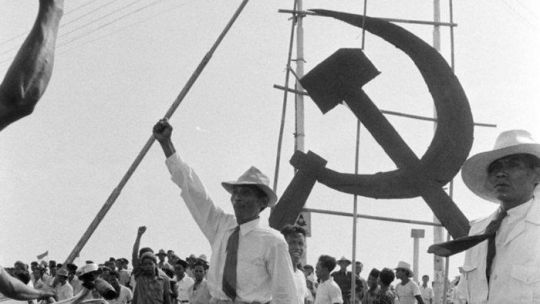
Campaign of the Indonesian Communist Party (PKI) in September 1955.
Terrified by the strength and organization of Indonesia’s people, the Indonesian military’s 30th September Movement began to purge the PKI.
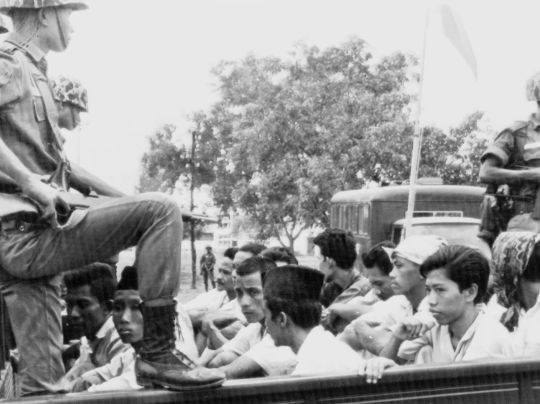
Men suspected of being IPK members being transported under guard by an armed Indonesian soldier
In the early hours of 1 October, a group of military conscripts murdered six high-ranking generals. Blaming the deaths on the PKI, Suharto used the attacks as a pretext to seize power. CIA communications equipment allowed him to spread false reports around the country and begin a long campaign of anti-communist propaganda.
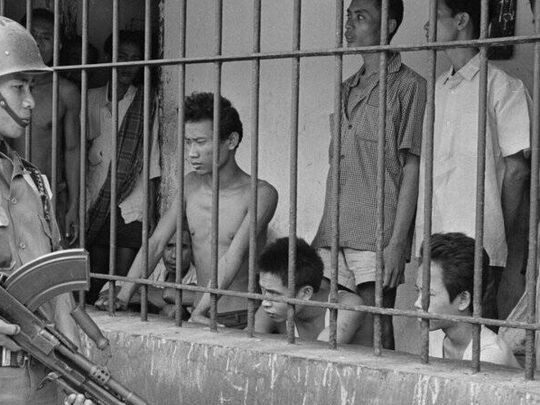
The US had tried to overthrow Sukarno for years; in 1958, the CIA backed armed regional rebellions against the central government. In 1965, they did all they could to aid Suharto’s murderous power grab.
The campaign soon became genocidal. On islands like Bali, up to 10% of the population was massacred — and luxury hotels soon began to appear over the killing fields.
One US embassy staffer told the US press that Suharto’s military “probably killed a lot of people, and I probably have a lot of blood on my hands, but that's not all bad.”
Time Magazine referred to the killings as “the West’s best news for years in Asia”.
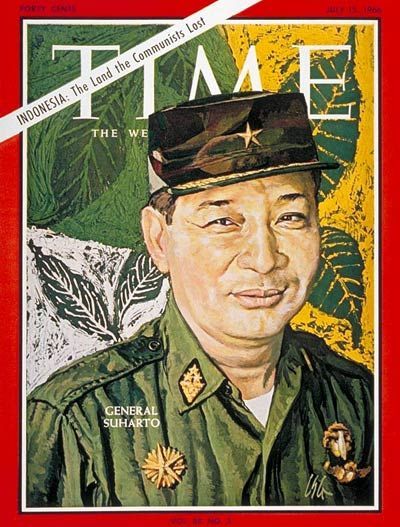
A cable from the US embassy’s first secretary, Mary Vance Trent, to the State Department referred to events in Indonesia as a “fantastic switch which has occurred over 10 short weeks”. It also included an estimate that 100,000 people had been slaughtered.
Cementing his power, Suharto became president in 1967. His ‘New Order’ policy allowed Western capitalism to exploit Indonesia’s cheap labour and plunder its natural resources. Civil rights and dissent were suppressed.
In one of the world’s most populous countries, any possibility for the emergence of a new, democratic political project was eliminated. Richard Nixon described Indonesia as “the greatest prize in Southeast Asia”. Suharto would not leave office until 1998.
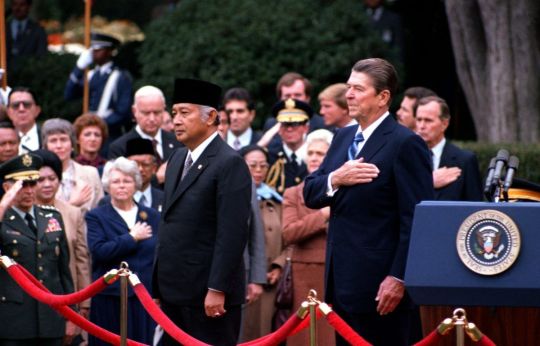
U.S. President Ronald Reagan stands with Indonesian President Suharto in the White House South Lawn at the arrival ceremony for Suharto's State Visit. Oct 12, 1982
CIA officers described Suharto’s rise to power and anti-communist purge as the “model operation” and “Jakarta” soon became the codeword for anti-communist extermination programs in Latin America, where hundreds of thousands were massacred in regime change efforts engineered by Washington.
#cold war#us imperialism#american imperialism#western imperialism#indonesia#indonesian history#politicide#indonesian genocide#cia#world history#general suharto#president sukarno#anti imperialism#communist history#decolonization#colonialism#southeast asia#1965 genocide#30 September Movement#balinese genocide#bali#indonesian killing fields#progressive international#knee of huss
72 notes
·
View notes
Text
the "decolonize Palestine" bullshit is just making this whole thing last longer. you are calling for ethnic cleansing of a native population. you are calling for a destruction of 4000 years of Jewish existence, and most importantly, you are spewing a narrative that leads to the death of thousands. "Decolonize Palestine from Jews" is a fucking bullshit lie.
you are supporting a fucking lie. Delegitimizing the Jewish connection to the land and changing fucking history is causing active harm.
YOU ARE LITERALLY ENCOURAGING AN ETHNIC CLEANSING OF JEWS IN THE GUISE OF OBJECTING AN ETHNIC CLEANSING OF PALESTINIANS.
and for the fucking brain dead, the only fucking solution is not eradicating Palestinian presence or making millions of Jewish refugees, it is creating a place where both peoples get to live together in safety.
That piece of "Israel is just a European colonial settler imperialistic state that stole Palestine" bullshit is just that, bullshit. Palestine was never an independent state, the Palestinians never had a fucking state, get it through your fucking mind. Should they get a state? SURE! did they refuse one again and again because the idea that Jews will have their state was considered unreasonable?
YES!
Did Jordan an Egypt prevented Palestine from becoming by annexing land between 1948-1967?
ALSO YES!
is there a fucking imbalance?
YES
are the Palestinians just innocent victims of the big bad Zionists?
NO!
Palestinians are part of this story, and if they will not take accountability for their behavior in the last 106 years, nothing will be solved!
the only fucking solution is for both sides to take accountability! AND I MEAN IT!
This is not a fucking colonizer vs. colonized situation! this is two natives fighting over who gets to live in the fucking house!
NON OF IT IS FUCKING OK!
#israel#palestine#gaza#decolonisation#decolonise palestine#decolonization#decolonize palestine#fucking idiots#ethnic clensing#rewriting history#twisting history#i/p#israel hamas war#calling for destruction is easy#making peace is harder#Jews are native to Israel#get the fuck over yourself#victimhood complex#if you would have just agreed to the fucking partition plan in 1948 all of this would have never happened!#but nooooo#you had to try and genocide the new Jewish state and fucking failed!#stop trying to eradicate Jewish presence in the fucking region
100 notes
·
View notes
Text
The Iron Wall by Ze’ev Jabotinsky (1923), Zionist leader and founder of the Jewish Self-Defense Organization.
context: i am sharing this so that we can take note to a pioneering zionist calling the ideology a form of colonization by name. this should not a be point of contention when the father of political zionism, theodore herzl, has done the same as well. see below:
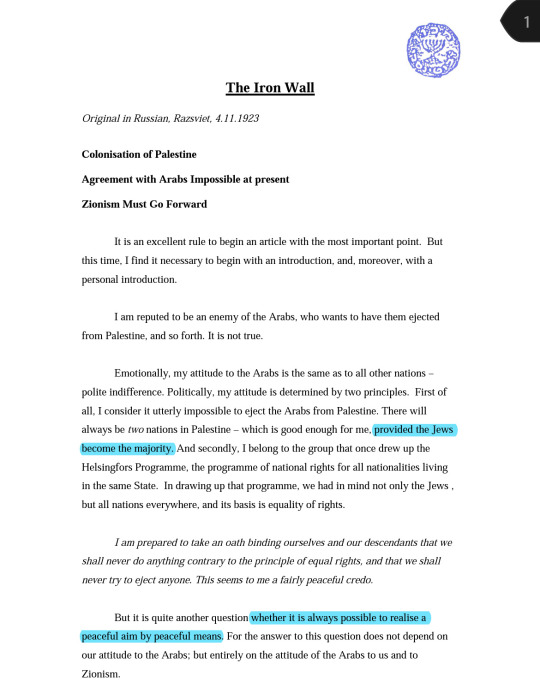
ID: “The Iron Wall
Original in Russian, Razsviet, 4.11.1923
Colonisation of Palestine
Agreement with Arabs Impossible at present
Zionism Must Go Forward
It is an excellent rule to begin an article with the most important point. But this time, I find it necessary to begin with an introduction, and, moreover, with a personal introduction.
I am reputed to be an enemy of the Arabs, who wants to have them ejected from Palestine, and so forth. It is not true.
Emotionally, my attitude to the Arabs is the same as to all other nations - polite indifference. Politically, my attitude is determined by two principles. First of all, I consider it utterly impossible to eject the Arabs from Palestine. There will always be two nations in Palestine - which is good enough for me, provided the Jews become the majority. And secondly, I belong to the group that once drew up the Helsingfors Programme, the programme of national rights for all nationalities living in the same State. In drawing up that programme, we had in mind not only the Jews. but all nations everywhere, and its basis is equality of rights.
I am prepared to take an oath binding ourselves and our descendants that we shall never do anything contrary to the principle of equal rights, and that we shall never try to eject anyone. This seems to me a fairly peaceful credo.
But it is quite another question whether it is always possible to realise a peaceful aim by peaceful means. For the answer to this question does not depend on our attitude to the Arabs; but entirely on the attitude of the Arabs to us and to Zionism.” End ID
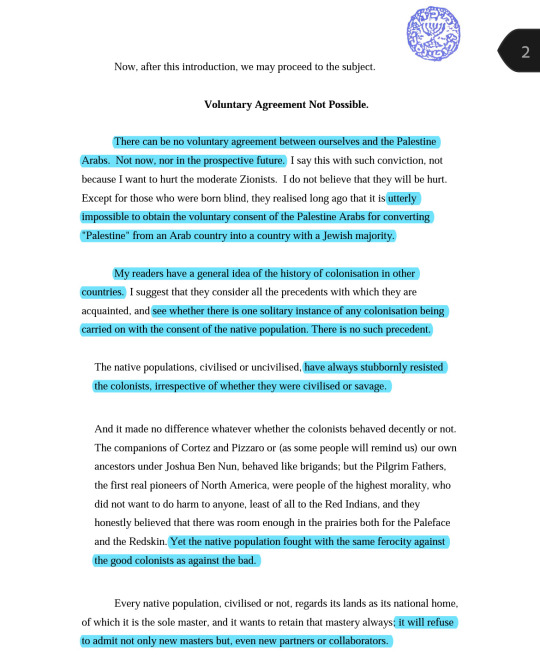
ID: “Now, after this introduction, we may proceed to the subject.
Voluntary Agreement Not Possible.
There can be no voluntary agreement between ourselves and the Palestine Arabs. Not now, nor in the prospective future. I say this with such conviction, not because I want to hurt the moderate Zionists. I do not believe that they will be hurt.
Except for those who were born blind, they realised long ago that it is utterly impossible to obtain the voluntary consent of the Palestine Arabs for converting
"Palestine" from an Arab country into a country with a Jewish majority.
My readers have a general idea of the history of colonisation in other countries.
I suggest that they consider all the precedents with which they are acquainted, and see whether there is one solitary instance of any colonisation being carried on with the consent of the native population. There is no such precedent.
The native populations, civilised or uncivilised, have always stubbornly resisted the colonists, irrespective of whether they were civilised or savage.
And it made no difference whatever whether the colonists behaved decently or not.
The companions of Cortez and Pizzaro or (as some people will remind us) our own ancestors under Joshua Ben Nun, behaved like brigands; but the Pilgrim Fathers, the first real pioneers of North America, were people of the highest morality, who did not want to do harm to anyone, least of all to the Red Indians, and they honestly believed that there was room enough in the prairies both for the Paleface and the Redskin. Yet the native population fought with the same ferocity against the good colonists as against the bad.
Every native population, civilised or not, regards its lands as its national home, of which it is the sole master, and it wants to retain that mastery always; it will refuse to admit not only new masters but, even new partners or collaborators.” End ID.
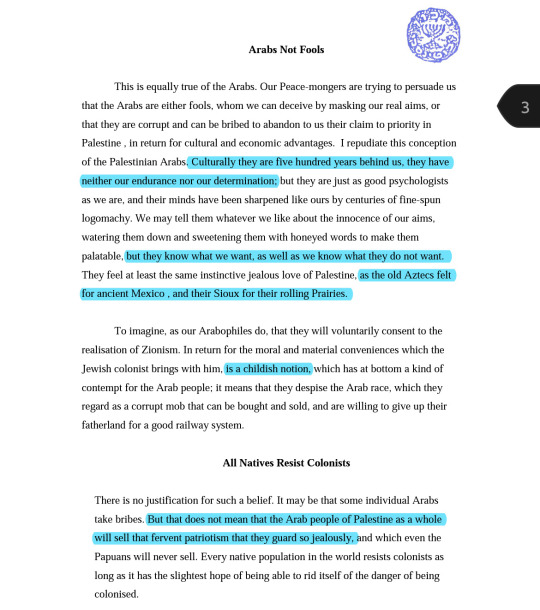
ID: “Arabs Not Fools
This is equally true of the Arabs. Our Peace-mongers are trying to persuade us that the Arabs are either fools, whom we can deceive by masking our real aims, or that they are corrupt and can be bribed to abandon to us their claim to priority in Palestine, in return for cultural and economic advantages. I repudiate this conception of the Palestinian Arabs. Culturally they are five hundred years behind us, they have neither our endurance nor our determination; but they are just as good psychologists as we are, and their minds have been sharpened like ours by centuries of fine-spun logomachy. We may tell them whatever we like about the innocence of our aims, watering them down and sweetening them with honeyed words to make them palatable, but they know what we want, as well as we know what they do not want.
They feel at least the same instinctive jealous love of Palestine, as the old Aztecs felt for ancient Mexico, and their Sioux for their rolling Prairies.
To imagine, as our Arabophiles do, that they will voluntarily consent to the realisation of Zionism. In return for the moral and material conveniences which the Jewish colonist brings with him, is a childish notion, which has at bottom a kind of contempt for the Arab people; it means that they despise the Arab race, which they regard as a corrupt mob that can be bought and sold, and are willing to give up their fatherland for a good railway system.
All Natives Resist Colonists
There is no justification for such a belief. It may be that some individual Arabs take bribes. But that does not mean that the Arab people of Palestine as a whole will sell that fervent patriotism that they guard so jealously, and which even the Papuans will never sell. Every native population in the world resists colonists as long as it has the slightest hope of being able to rid itself of the danger of being colonised.” End ID.
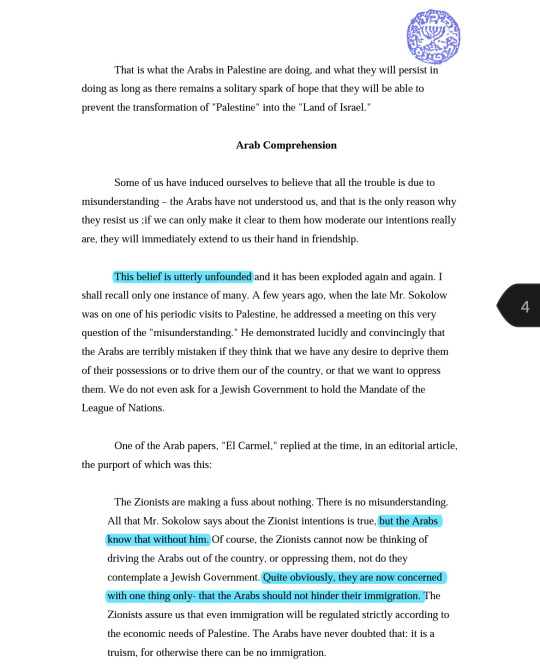
ID: “That is what the Arabs in Palestine are doing, and what they will persist in doing as long as there remains a solitary spark of hope that they will be able to prevent the transformation of "Palestine" into the "Land of Israel."
Arab Comprehension
Some of us have induced ourselves to believe that all the trouble is due to misunderstanding - the Arabs have not understood us, and that is the only reason why they resist us if we can only make it clear to them how moderate our intentions really are, they will immediately extend to us their hand in friendship.
This belief is utterly unfounded and it has been exploded again and again. I shall recall only one instance of many. A few years ago, when the late Mr. Sokolow was on one of his periodic visits to Palestine, he addressed a meeting on this very question of the "misunderstanding." He demonstrated lucidly and convincingly that the Arabs are terribly mistaken if they think that we have any desire to deprive them of their possessions or to drive them our of the country, or that we want to oppress them. We do not even ask for a Jewish Government to hold the Mandate of the League of Nations.
One of the Arab papers, "El Carmel," replied at the time, in an editorial article, the purport of which was this:
The Zionists are making a fuss about nothing. There is no misunderstanding.
All that Mr. Sokolow says about the Zionist intentions is true, but the Arabs know that without him. Of course, the Zionists cannot now be thinking of driving the Arabs out of the country, or oppressing them, not do they contemplate a Jewish Government. Quite obviously, they are now concerned with one thing only- that the Arabs should not hinder their immigration. The Zionists assure us that even immigration will be regulated strictly according to the economic needs of Palestine. The Arabs have never doubted that: it is a truism, for otherwise there can be no immigration.” End ID.
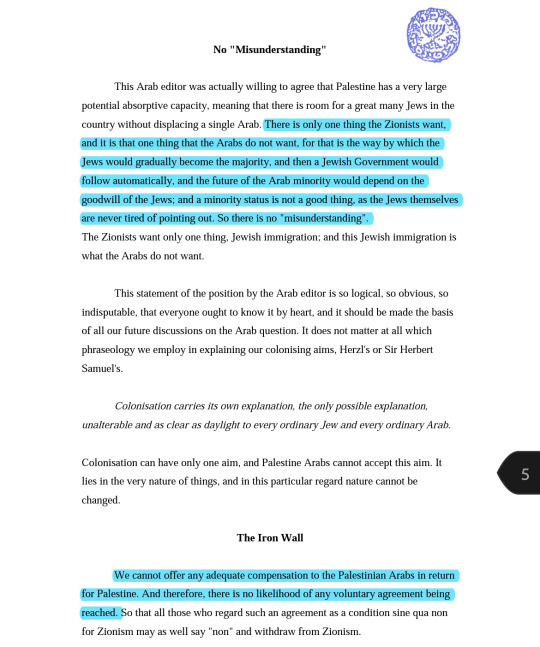
ID: “No "Misunderstanding"
This Arab editor was actually willing to agree that Palestine has a very large potential absorptive capacity, meaning that there is room for a great many Jews in the country without displacing a single Arab. There is only one thing the Zionists want, and it is that one thing that the Arabs do not want, for that is the way by which the Jews would gradually become the majority, and then a Jewish Government would follow automatically, and the future of the Arab minority would depend on the goodwill of the Jews; and a minority status is not a good thing, as the Jews themselves are never tired of pointing out. So there is no "misunderstanding".
The Zionists want only one thing, Jewish immigration; and this Jewish immigration is what the Arabs do not want.
This statement of the position by the Arab editor is so logical, so obvious, so indisputable, that everyone ought to know it by heart, and it should be made the basis of all our future discussions on the Arab question. It does not matter at all which phraseology we employ in explaining our colonising aims, Herzl's or Sir Herbert Samuel's.
Colonisation carries its own explanation, the only possible explanation, unalterable and as clear as daylight to every ordinary Jew and every ordinary Arab.
Colonisation can have only one aim, and Palestine Arabs cannot accept this aim. It lies in the very nature of things, and in this particular regard nature cannot be changed.
The Iron Wall
We cannot offer any adequate compensation to the Palestinian Arabs in return for Palestine. And therefore, there is no likelihood of any voluntary agreement being reached. So that all those who regard such an agreement as a condition sine qua non for Zionism may as well say "non" and withdraw from Zionism.” End ID.
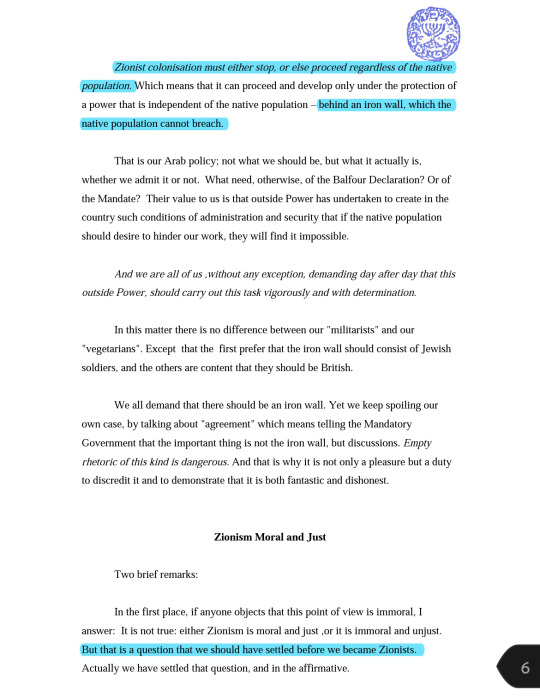
ID: “Zionist colonisation must either stop, or else proceed regardless of the native population. Which means that it can proceed and develop only under the protection of a power that is independent of the native population - behind an iron wall, which the native population cannot breach.
That is our Arab policy; not what we should be, but what it actually is, whether we admit it or not. What need, otherwise, of the Balfour Declaration? Or of the Mandate? Their value to us is that outside Power has undertaken to create in the country such conditions of administration and security that if the native population should desire to hinder our work, they will find it impossible.
And we are all of us, without any exception, demanding day after day that this outside Power, should carry out this task vigorously and with determination.
In this matter there is no difference between our "militarists" and our
"vegetarians". Except that the first prefer that the iron wall should consist of Jewish soldiers, and the others are content that they should be British.
We all demand that there should be an iron wall. Yet we keep spoiling our own case, by talking about agreement" which means telling the Mandatory Government that the important thing is not the iron wall, but discussions. Empty rhetoric of this kind is dangerous. And that is why it is not only a pleasure but a duty to discredit it and to demonstrate that it is both fantastic and dishonest.
Zionism Moral and Just
Two brief remarks:
In the first place, if anyone objects that this point of view is immoral, I answer: It is not true: either Zionism is moral and just ,or it is immoral and unjust.
But that is a question that we should have settled before we became Zionists.
Actually we have settled that question, and in the affirmative.” End ID.
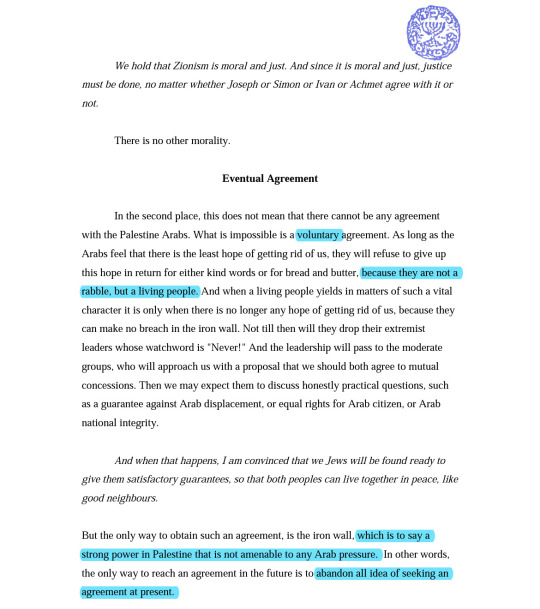
ID: “We hold that Zionism is moral and just. And since it is moral and just, justice must be done, no matter whether Joseph or Simon or Ivan or Achmet agree with it or not.
There is no other morality.
Eventual Agreement
In the second place, this does not mean that there cannot be any agreement with the Palestine Arabs. What is impossible is a voluntary agreement. As long as the Arabs feel that there is the least hope of getting rid of us, they will refuse to give up this hope in return for either kind words or for bread and butter, because they are not a rabble, but a living people. And when a living people yields in matters of such a vital character it is only when there is no longer any hope of getting rid of us, because they can make no breach in the iron wall. Not till then will they drop their extremist leaders whose watchword is "Never!" And the leadership will pass to the moderate groups, who will approach us with a proposal that we should both agree to mutual concessions. Then we may expect them to discuss honestly practical questions, such as a guarantee against Arab displacement, or equal rights for Arab citizen, or Arab national integrity.
And when that happens, I am convinced that we Jews will be found ready to give them satisfactory guarantees, so that both peoples can live together in peace, like good neighbours.
But the only way to obtain such an agreement, is the iron wall, which is to say a strong power in Palestine that is not amenable to any Arab pressure. In other words, the only way to reach an agreement in the future is to abandon all idea of seeking an agreement at present.” End ID.
#reaux speaks#resources#anti zionism#colonialism#decolonization#colonization#israel#jabotinsky#history#palestine#discrimination#arab#indigenous#land back#native#zionism#jewish#jumblr#free palestine
105 notes
·
View notes
Text
When Indonesians Fought Colonization – And Won
youtube
21 notes
·
View notes
Text
Indigenous people of Europe
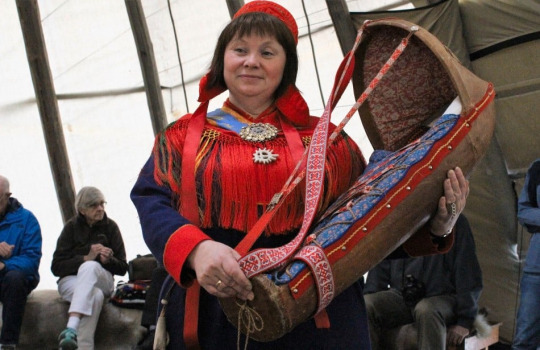
Let me talk about something that really is not talked and thought about in general: The indigenous people of Europe. Because, well, it is something that kinda tends to get ignored often enough, as we think of indigenous cultures as something that existed outside of Europe, before being settled by Europeans.
But it is a lot more complicated than that. Because there were indigenous people in Europe - and there still are to this day. The best known example are probably the Sami in northern Russia and the Scandinavian countries. And be it just because they got depicted in Frozen and in the Klaus Netflix movie.
To quote Wikipedia:
Some groups that claim indigenous minority status in Europe include the Uralic Nenets, Samoyed, and Komi peoples of northern Russia; Circassians of southern Russia and the North Caucasus; Crimean Tatars, Krymchaks and Crimean Karaites of Crimea (Ukraine); Sámi peoples of northern Norway, Sweden, and Finland and northwestern Russia (in an area also referred to as Sápmi); Galicians of Galicia, Spain; Catalans of Catalonia, Spain and southern France; Basques of Basque Country, Spain and southern France; and the Sorbian people of Germany and Poland.
Indigineity in Europe is a complicated thing, because even the non-indigenous people here have been around in this area for a long while. It also is closely related to the artificiality of "whiteness" (I am gonna talk about that a bit more next week).
In the end the "western European culture" as we know it is mostly a result of colonialism through the Romans. Only that this happened 2000 years ago and in a process that was not quite comparable to how colonialism of the non-European regions went.
Though then again, there was a phase during which similar genocide happened within Europe, when it came to the indigenous cultures and religions: The heathen hunts in the 4th century, which did involve the killing of followers of older religions, destruction of temples and religious places of worship and the forceful conversion of the "heathens" to Christianity.
But, again, this happened a long, long time ago. Which is why it tends to not be remembered as such. (In fact, I doubt most people know about this happening.)
There were more indigenous people in Europe before that, but one by one most of those cultures just disappeared.
Still, those that remained often face often similar problems to non-European indigenous people. As minorities they tend to be discriminated against, at times even by law. The borders often do not allow them to move through what has originally been their territory. And many have had their land taken away from them - or still get their land taken.
And given that most people are not even aware that those groups exists, this topic tends to get ignored by a lot of people.
So, yeah, I just wanted to talk about this. Because we really need to be aware about what is happening everywhere. And how those things have happened over thousands of years.
113 notes
·
View notes